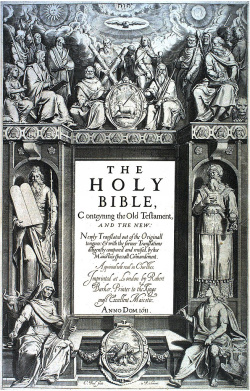A Product of Its Time
The King James Bible, commissioned by King James I of England, was published in 1611 A.D. It took seven years for forty-seven Church of England scholars, who borrowed heavily from the work of William Tyndale (c. 1494 - 1536), to produce it. The scholars who labored to produce this Bible used the same Early Modern English words as Shakespeare who, in 1611, was still writing at the age of forty-seven.
The difficulty in reading the King James is primarily due to the inherent static nature of its text. While the Bible text has remained the same, the English language it was built upon has continued to gradually change over the years.
The morphing of English over the past four centuries has led to many of the words and phrases in the King James Bible to be considered archaic and laborious to comprehend. This situation has also led to numerous other complete translations cropping up, now numbering more than 100, seeking to make God's word even more accessible and readable to a modern audience.

What is Archaic?
Archaic words, in relation to the King James Bible text, are those which are no longer used or considered obsolete, or those whose modern meanings differ from that attached to them in 1611.
Antiquated Words
Many words in the King James are either no longer or only rarely used today. They can make the Bible seem unintelligible and downright confusing since they convey no obvious meaning to modern readers.
Some of the most numerous archaic KJV words include betwixt, doth, hast, hath, hither, froward, nay, shalt, thee, thence, thine, thither, thou, thy, whence, whither, whoso, wilt, ye and yea. These words together occur an amazing 25,000+ times in Scripture!
A single verse in the Bible can contain several archaic words as is shown below (highlighted in bold).
And they said, We saw certainly that the Lord was with thee: and we said, Let there be now an oath betwixt us, even betwixt us and thee, and let us make a covenant with thee (Genesis 26:28, KJV throughout).
Antiquated Inflections
Antiquated verb inflections in the Bible are usually manifested in certain words that end with -est (e.g. couldest, eatest, mayest) or -th (e.g. liveth, believeth). Other obsolete verb inflections end in -st such as believest, didst, dost and lovedst.
But of the tree of the knowledge of good and evil, thou shalt not eat of it: for in the day that thou eatest thereof thou shalt surely die (Genesis 2:17).
And whosoever liveth and believeth in me shall never die. Believest thou this? (John 11:26).
Differing Meanings
One of the major stumbling blocks that makes the King James Bible hard to understand is the change in meaning of some of its words.
One well-known example of a change in meaning can be seen in the KJV's use of the word charity. Appearing 29 times in the New Testament, charity was a 1611 English word used to denote love. Today, however, it is commonly utilized to describe an organization dedicated to helping those in need. It can also reference the goods or money people offer those less fortunate than themselves.
Charity [love] suffereth long, and is kind; charity [love] envieth not; charity [love] vaunteth not itself, is not puffed up . . . (1Corinthians 13:4).
Another word whose changed meaning can easily confuse even the most avid reader of the Bible is coast. Its use in the King James, the vast majority of the time, is as a reference to a border or area that was next to something that was not a body of water. We use the word coast today, however, to reference land that does lie next to or near a body of water like a sea.
And their coast was from Mahanaim, all Bashan, all the kingdom of Og king of Bashan, and all the towns of Jair, which are in Bashan, threescore cities (Joshua 13:30).
When Jesus came into the coasts of Caesarea Philippi (located inland northeast of the city of Dan), he asked his disciples, saying, Whom do men say that I the Son of man am? (Matthew 16:13).
Meaning of Bible Words
Please see our article entitled Meaning of King James Words to discover the definition of many of the Bible's hard to understand words!